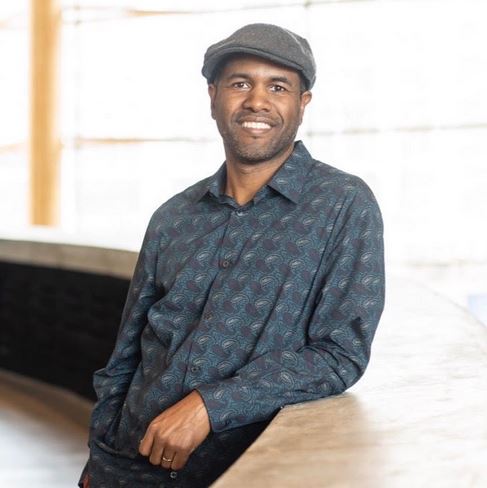
Before he began hosting Psalm’s Salons for Studio Theatre, playwright and director Psalmayene 24 didn’t yearn to interview fellow artists in public — with or without his preferred soft drink (ginger beer) in hand.
“I had zero desire to do this,” the busy local theater-maker confesses, recalling his path to emceeing the monthly virtual event, which he describes as “a cultural space that celebrates excellence, unity and the spirit of joy through an unapologetically Black lens.” The latest installment streams Sept. 18 at 5 p.m. with a trio of high-profile guests: Will Power, Danny Hoch, and Jonzi D, pioneers of hip-hop theater.
If Psalm (as he’s known to colleagues) acquired his new gig by default — answering “an opportunity and a need,” he says — he has come to relish it, and has arguably reinvented the online theater-chat format along the way. Free, and streamed live on Studio’s Facebook and YouTube pages, the salons have featured such guests as playwright James Ijames, actors Natalie Graves Tucker and Justin Weaks, and playwright-performer Lady Dane Figueroa Edidi. Conversations cover substantive and urgent issues — from the interviewees’ artistic processes and philosophies; to systemic racism in America; ongoing activism for social justice; the death of Rep. John Lewis; and recent calls for the American theater field to acknowledge and rectify its own racism.AD
But while the discussions tend overall toward seriousness, the salons often boast an upbeat, even celebratory vibe. D.C.-based DJ Nick “tha 1da” Hernandez spins original live music. Participants regularly exchange toasts during a “Mental Health Drink Break,” allowing Psalmayene 24 to indulge in the aforementioned ginger beer, and everyone else to swig beverages of choice. Shout-outs to Black-owned restaurants — host, DJ and guests dish about dishes they have ordered that day — add a sense of community, even as participants zoom in from shelter-in-place locations.
Speaking by phone from Silver Spring — “Piscataway land,” he stresses, acknowledging the Indigenous residents — Psalmayene 24 says there’s no contradiction between the salons’ buoyancy and intense content. The episodes mirror life, he observes, “where you have comedy and tragedy. It’s like the iconic mask of theater.” He adds, “Black people in this country — we have dealt with a lot of pain.” But to find meaning in life, he notes, “You have to find joy. You have to find laughter.” Indeed, he says, “Joy is part of how we fight.”
Psalm’s Salons launched in June, three months after covid-19 forced Studio to suspend performances of Antoinette Nwandu’s play “Pass Over,” which Psalmayene 24 had directed. The pandemic also affected a planned outreach series, aimed at deepening Studio’s connections with Black millennial audiences. On board as host, Psalmayene 24 envisaged conversations fused with music, with touches of dance party.
When the series had to move online, he drew inspiration from the popular “Verzuz” Instagram musical battles launched early in the pandemic by superproducers Timbaland and Swizz Beatz. “Two hip-hop artists who are re-creating how people commune — I thought that was fascinating,” Psalmayene 24 says. He’s a hip-hop-theater eminence himself; he even wove hip-hop touches into “Les Deux Noirs,” his play about Richard Wright and James Baldwin, staged last year by Mosaic Theater Company. The “Top Five” feature in Psalm’s Salons, in which guests name favorite theater works, nods to a hip-hop tradition of ranking rappers, he says.
For tunes, he turned to Hernandez — a frequent collaborator, who had designed sound for Theater Alliance’s “Word Becomes Flesh,” winner of five 2017 Helen Hayes Awards, including for Psalmayene 24’s direction. Mixing his own material with audio from the Library of Congress’s Citizen DJ tool, Hernandez creates the salons’ introductory and incidental music, catchy enough that participants can be seen nodding to the beat.AD
The music adds palpable energy and a sense of “exciting connection,” notes Studio associate artistic director Reginald L. Douglas. “Having Nick is such a boon,” he says.
Hernandez also creates a Spotify playlist for each episode. There’s space for uplift, even alongside weighty talk about societal issues, he thinks, especially because the current moment of national reckoning could lead to a better future. “A lot of times people associate change with being in turmoil, where it should be more about a blooming process,” Hernandez says.
When it comes to guests, Psalmayene 24 says the aim is to recruit people who can speak “eloquently about their art, but also can speak to the times.” (At next month’s salon, on Oct. 22 at 5 p.m., Mildred Ruiz-Sapp and Steven Sapp, of the Universes theater company, will fit that bill. The salons will run at least through November.) The key to interviewing, Psalmayene 24 has found, is not only the preparatory research he loves to do, but a willingness — as with good acting — to listen and “relax in the moment, love the moment.”AD
So, while the covid-19 era finds the 47-year-old busier than ever — among other projects, he has contributed to Arena Stage’s in-house film series and Round House Theatre’s Web series “Homebound” — he has time for the “high wire” of hosting.
Salons are, in their way, an artistic genre. “To experiment and explore form as an artist — that’s something deeply important to me,” Psalmayene 24 says.
Where to watch
Psalm’s Salons
Studio Theatre’s Facebook and YouTube pages: facebook.com/the.studio.theatre and youtube.com/studiotheatredc.
Dates: Friday at 5 p.m.
Admission: Free.
Read the full article by Celia Wren from the Washington Post here.